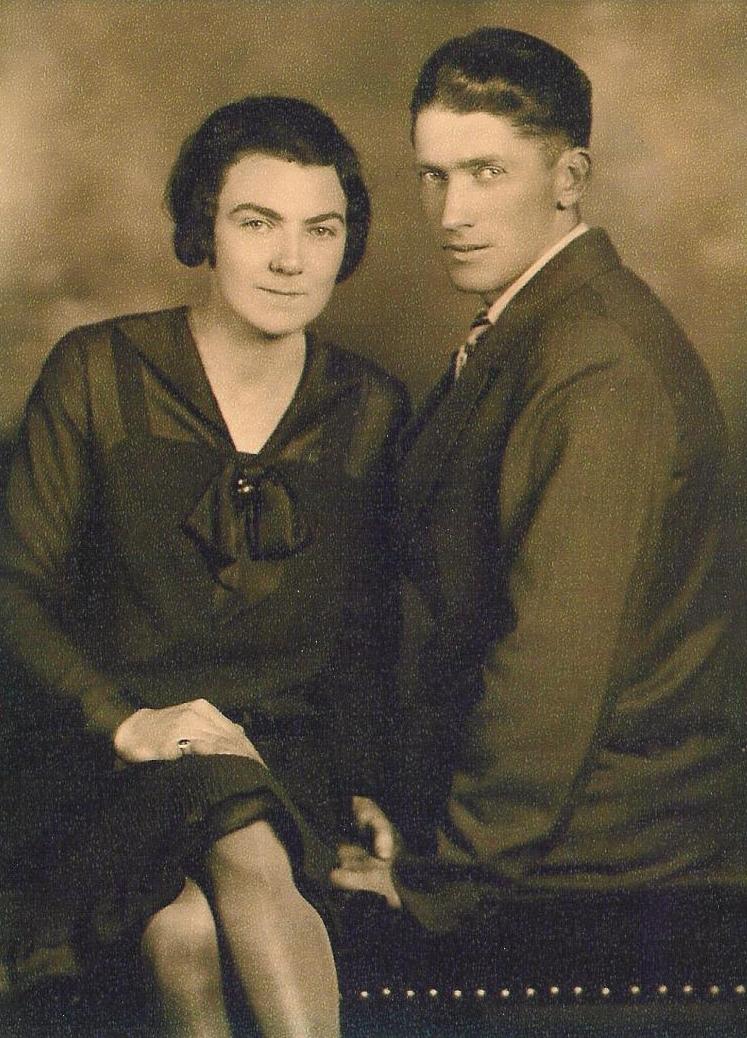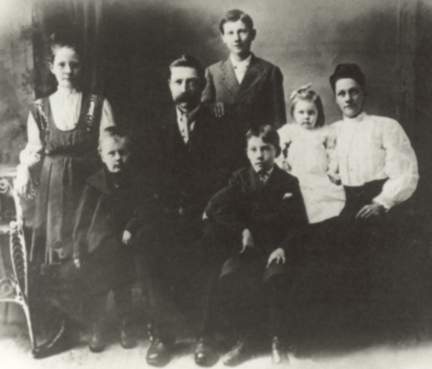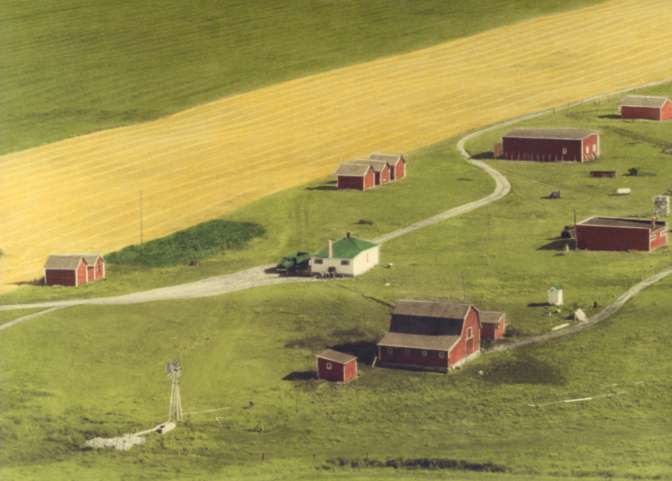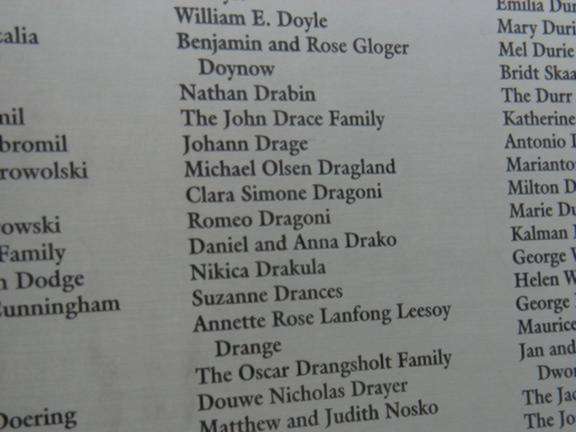Family History of Rudolph (Rudy) Magnus Dragland 1899 - 1984
 |
| Rudy and Vale's wedding - Dec 20, 1928 |
By Amanda (Mandi) Vale Dragland
February 25, 2003
During the past few days I've been gathering information about my family, and tracing back our roots from Rudy Dragland, and when he first came to Canada as an immigrant. I'm extremely glad that I've been given this opportunity to look in-depth at the lives of those who came before me, and that I've been able to re-trace the histories, journerys, and lives of those who've set the road for my very own life.
Rudolph (Rudy) Magnus Dragland was my great-grandfather. He was born in Grand Forks, North Dakota, USA on July 18th, 1899. He was the fourth eldest of eight children. At that time it was common to have large families due to the high child mortality rate, and the fact that lots of children meant lots of workers. His father, Mikal Peder Olsen Dragland, had immigrated from Norway to North America in 1887, landing first in New York, looking for adventure and opportunity in the new world. Norway, at that time, was a poor country, and many Norwegians were immigrating to North America.
The name "Dragland" has a unique and interesting origin. In Norway, the typical person's name had three parts:
1. the Christian name(s), e.g., Mikal Peder
2. son/daughter of (father's name), e.g., Olsen - son of Ole, and
3. place of birth, e.g., Dragland.
When Mikal landed in Ellis Island, NY, and was asked for his name, he gave them the name Mikal Peder Olsen Dragland. Of course, Dragland was the place he had come from, (a village in Norway) but since the American government did not recognize the Norwegian naming convention, they used "Dragland" as his permanent last name. When Mikal arrived, he only spoke Norwegian, but eventually learned English. His children learned English, and only knew a few words of Norwegian.
Rudolph being one of them. They did not get to choose where the land was, or what it would be like. They were simply given the title to the land and told to go there and begin to cultivate it. At that time, free land was an amazing opportunity, for most people worked on farms or had regular jobs for a living. For example, Mikal was a butcher in North Dakota, but he had always dreamed of having his very own farm. (His family had been fishers and farmers in Norway.) The thought of owning your own land was a magnificent thing, and the idea of coming all the way to Canada to cultivate new, unexplored territory had the thrill of adventure.
 |
| Mikal and Mary Dragland with their children (circa 1907) L-R: Alma, Ted, Mikal (father), Oscar (standing at back), Rudolph, Alice (baby), and Mary (mother) |
After obtaining their deed, the family travelled by train in a stockcar filled with animals from Lethbridge to Bow Island. From there, they rode in a covered wagon to find the area that would soon be their new home. The first few years on the farm were difficult. They had to build their houses out of sod, because lumber was scarce. Only a few years later were they able to make a new homestead with the aid of wood from BC. When they were old enough, Mikal gave his three eldest sons their own farms. Oscar, Ted, and my great-grandfather, Rudolph each had their own farms to work on, and later raise families on.
Rudolph (also known as Rudy) was an honest, generous, and intelligent man who was respected by all his family and associates. While his father, Mikal, had no formal schooling, Rudy went up to grade 6, which was common for a young boy in his time. Despite this, he was mostly self-educated and read many books.
When Rudy was in his twenties, he lived through what were called the "Roaring 20's". He had an amazing life then. His family was wealthy; he was a popular, handsome young man with a farm of his own and a fancy car. Although he loved his farm, and loved farm-life, he travelled often due to his adventurous, knowledge-seeking nature. Once, he travelled to Beverly Hills, California, where he got a small part in the movie "Seahawk". (He played the part of a slave.)
In 1926, he was working as a policeman, and he met Vale Jennings Sampson, who was born on May 16th, 1903. She was of British/American descent, and was later to become his wife. The first time they met was at a picnic, and he later met her at a dance in 1927, where he asked her to come to Chicago with him. She refused.
 |
| Rudy Dragland Farm in Southern Alberta (circa 1960) |
Vale (my great-grandmother, from whom my middle name is taken) grew up much the same as my great-grandfather did. She lived in a sod house before lumber was available, and went to school up to grade 8. She emigrated from Benton, Wisconsin, because of the free land, and because her father (Bert Sampson) believed that the prairies would be better for his health. There were only fifteen students at the school she attended, and it was 2 miles away from her farm. They took horse-drawn carriages to school and back, and went to school from 9:00 am to 3:30 pm, just like today. Both men and women taught school, but in those days married women could not teach due to their obligations in the home. Her best friend when she was young was a girl named Velma, who lived about 2 miles away, and Vale would visit her house often. Vale and Velma remained close friends for their whole lives. She and her friends would play baseball, and go on picnics.
Vale lived in her parents' home until she was twenty years of age. In 1923 she worked at a grocery store, and then a few years later worked in a telephone office as an operator, although she did not own a phone herself until her elderly years.
On December 20th, 1928, Vale and Rudy were married. They had a small wedding in Lethbridge, and spent their honeymoon in Great Falls, Montana. They lived on Rudy's farm with his younger brother (Ted) and his younger brother's wife (Winnie). They would play cards and go to dances for entertainment, and on Sundays people would come over to their farm for dinner. They weren't very religious, and they didn't have a radio because radios were extremely expensive at that time. They had two sons: Leonard, who was born in January 5, 1930; and Lawrence (my grandfather) who was born in March 25, 1931.
During the first ten years of their lives (as newlyweds and as a young family), life was tough. At this time, they were just beginning to hit the great depression, which caused economic catastrophes and poverty. There was also a large drought during the 1930's, which made farming extremely difficult. The family got through, though, because they shared food with neighbours, and Rudy owned a very good well that never ran dry. Sometimes neighbours would come asking for water, and in return for his sharing water with them, they would give Rudy supplies. Rudy and Vale would get up at 6:00 every morning. Rudy would harness the horses, and then they would have breakfast at 7:00. He plowed with a team of 6 horses, and didn't have the aid of tractors until the mid-1940's. The depression affected wheat sales, and times were hard; but they made it.
The years of World War II (starting in 1939) were a prosperous time for farmers. Farmers were important and valued; because the government would buy up all the crops they could produce, in order to feed the soldiers. Farming was advancing technologically as well, from horse-drawn plows to tractors and combines; and the climate improved dramatically, boosting productivity. Their farms produced mostly wheat and other grains, which were an important industry. At the end of the war, and throughout the 1950's the economy continued to improve tremendously, and farmers were at the peak of their productivity.
In the 1960's, the farm became hard to maintain. Rudy was getting older and was unable to carry out some of the jobs he used to be able to do, and more people were moving to the city to find jobs, so farms were running out of workers and neighbours. They sold the farm to their nephew Vern Hoey Dragland (who later owned all four Mikal Dragland farms) in 1966, and moved to a small house in the City of Lethbridge (615 - 20th Street South). The first time they owned a phone was when they moved into that house, and they rarely ever used it. Rudy died in 1984, at the age of 85. After Rudy's death, Vale moved into an apartment, and lived there until 1992, reaching the age of 88.
Rudy's son (my grandfather) Lawrence Dale Dragland was born March 25th, 1931. He spent his childhood growing up during the depression, and because of this negative impression of farm-life, he couldn't wait to leave the farm and move into the city. It was a very common thing around this time for adolescents to want to leave the farm. Similar to how owning your own farm was the new frontier in his father's day, the city was the place where everything was booming in Laurence's day.
 |
| Ellis Island Immigration Monument |
Lawrence went to school until grade 12, where he met his wife, (my grandmother) Nona May Annon, born May 29th, 1933. They married after Laurence finished High School and moved to Calgary, Alberta. On April 1st, 1950, my father, Vaughn Leonard Dragland was born. Two years later, they moved to Medicine Hat and then later to Lethbridge. Together, they had four other children: Jeanne, Dean, Brad, and Todd. Lawrence also had another son, Michael David Gnam. Lawrence and Nona divorced in 1960.
My father (Vaughn) went to the University of Lethbridge, and had a son named Michael Raymond Dragland with his first wife, Jane Goodall. He later met my mother, Cornelia Ingrid Schillup, born November, 1st, 1955, in Toronto, and had me and my sister, Fallon. I was born in 1986 and my sister in 1988. My parents have been happily married for 22 years as of this writing (2003).
It is extremely interesting to look at the differences that only a few generations can make. My great grandmother didn't have a phone until she was an elderly woman. My own father didn't own a computer until he was in his late 30's. I now communicate with dozens of friends via the Internet, and talk for hours over the phone. Also, I've only visited a few farms in my lifetime, and they were always short visits. I couldn't even imagine the idea of having to use an outhouse every time I need to use the washroom, or having to ride a horse-drawn buggy to school. We can't stay snowed-in for three weeks, or else we would miss out on our busy schedules. Everything seems to be developing so fast, and vast expectations are put on today's youth. My great-grandfather only went to grade 6, and now for most of my schoolmates, it's mandatory to go to University or College.
Sometimes I would just like to take a few days off to relax and enjoy life at a slower pace. After having done this assignment, and living in the fast lane that is the world today, I can appreciate my great-grandfather's love for his farm, and his way of life.
Back to the list of stories


.gif)
